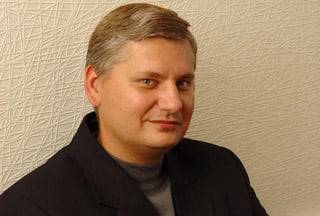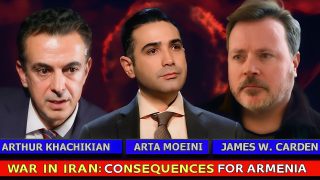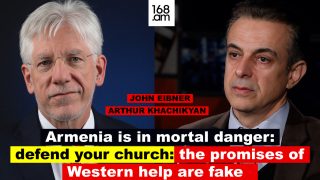Sergey Markedonov: If the power in Armenia changes that won’t affect on the Russian vector radically

Interview with Russian political scientist Sergei Markedonov
-In your recent interview you said that Moscow doesn’t interfere with Armenia’s domestic policy and mentioned that the recent active statements of former president Robert Kocharyan were not agreed with the Kremlin. Why do you think so?
-I think that it is only up to the Armenian political elite to decide who will be Armenia’s president or prime minister. Moscow can be for or against something but I don’t think that this position can be decisive. It is a fact that Kocharyan was a predictable counterpart for Russia – first for Yeltsin and later for Putin. Many issues were decided due to personal contacts. However this does not mean that everyone is for Kocharyan’s appointment. Currently the situation in Armenia is very dangerous as any change in the status-quo situation may be fatal. Maybe due to this reason Moscow will not oppose to this possibility but it is more about how the Armenian political elite and opposition to this elite will relate to this. Kocharyan has challenges too because does not have very pure image; I am not saying he is not democratic, I am saying that he is not very pure. The incumbent government would like to keep him away from the power too because they don’t want to be the number two. Sargsyan’s whole term was focused on overcoming this complex in order to show: “I am not just one appointed by Kocharyan, I am independent.” Kocharyan is not old yet; he knows what politics is and can pursue goals. The opposition will not forgive him for what happened on march 1. Even if Washington and Moscow raise say that they endorse Kocharyan and Kocharyan is number one candidate for the prime minister post, Armenia has its domestic audience that can’t be ignored.
-What do you think about the Armenian opposition today? Now the situation in Armenia has gone so far that any social issue is potentially a political demonstration.
-First, the elections of last year showed that people are very frustrated now. Raffi Hovhannisyan’s vote that exceeded 36 percent is a good example of this. As far as I know this candidate had not ever collected more than 10 percent any time before that. It is a fact that people that voted for him did not vote for his democracy but voted for him because they were against then incumbent ones. Later he wasn’t able to use his votes and strengthen his positions during the council elections. Whatever it is, this 36 percent vote he received was a message that people are very disappointed about the incumbent government. This is the most interesting part because some of his constituency think that the prices of gas are high, others think pension payments are not enough, and others are concerned about other social issues. However, there is no cohesive opposition in Armenia. Armenian National Congress (ANC) party doesn’t like Heritage party, and Heritage people think they are number one opposition power after the recent election. I would not ignore Levon Ter-Petrosyan. He didn’t participate in the election but he publishes articles and announcements from time to time, he is present in the public field. Now Dashnaks are not the same as before. Actually I think they are like the communists of Russia in some terms: they always try to protect the traditional values. Similar to our communists that have nothing in common with Lenin, the Dashnaks of our days have nothing in common with the traditional Dashnaks. Whatever it is, people are really disappointed about the government but there is no uniting force that would mobilize all opposition forces to the incumbent government. Maybe such power will come up at some point. A lot will depend on the behavior of the government. Back in the day the government was able to imitate slogans from the opposition. Do you remember Kocharyan was called Lukashenko by the West after the 2003 elections. After that he came up with the idea to hold a constitutional referendum. They started to declare that Kocharyan had already become democratic, a positive politician, etc. The same happened in the case of Serzh Sargyan. The latter was able to slightly better the situation after March 1 and let the ANC to enter parliament. It isn’t ruled out that the government may in the near future invite some of the opposition figures to take on positions in the government and get rid of the currently least popular officials. This may also appease the situation but in the short run.
-What is your opinion of the policies of the opposition in regards to foreign affairs? The majority of opposition parties, excepting several of them, didn’t mind the further membership of Armenia in the Customs Union practically. I mean the majority of them didn’t speak publicly against this policy and they didn’t say anything clear about the European integration of Armenia. What is the reason of this?
-Nonetheless, Armenia is a small country. It is not Russia, USA, Brazil and it should have good relations with all the powerful states. That is the reason why the political elite of Armenia doesn’t wish to deteriorate relations with Russia, with the West or Iran. During the tenure of Levon Ter-Petrosyan and all other presidents the same policy has been implemented. Politics is the art of means. Under the current circumstances Serzh Sargsyan had to abide with the requirements of the situation. He never said that Armenia shouldn’t have good relations with the West. So I think it is pretty typical to Armenian politics to focus on concrete interests or tactical considerations, rather than on values. It is clear when two out of the four borders of the country are closed and the conflict is not resolved then Armenia couldn’t possibly have a big choice of means. The current policy of Armenia is explained by these factors. In this regard, ANC doesn’t resemble other post-soviet parties. ANC and Ter-Petrosyan have numerously said that the relations with Russia should be developed. Armenia differs from the post-soviet states in this sense including the Ukraine and even Belarus. In those countries the opposition strongly criticizes Moscow. It is a paradox, however, that many people in Moscow consider Ter-Petrosyan as a pro-western politician. They have probably not read the writings of the former president and don’t know this politician. Actually, he is a more complex person.
-By the way, in his few speeches of the last year Ter-Petrosyan said that “we shouldn’t curse Russia and Putin”. Isn’t it a paradox for you that they are against cursing Putin but support the idea of cursing the incumbent authorities of Armenia, which is also sponsored by Putin?
-Regardless if people like that or not but the president of Russia is Putin. He is the person that leads the political course of Russia. I personally have very difficult relations with him. And being a Russian citizen I haven’t voted for him. But in the aspect of foreign relations I am willing to support him because he is representing my country. And when Ter-Petrosyan is saying we shouldn’t curse Putin he means the fact that Armenia is a small country and if someone from the opposition calls him a fool no one will benefit from it. Where did Sahakashvilli end up by constantly insulting Putin? It all depends how constructive the relations are. I think Ter-Petrosyan is right in this regard. According to me, he has various reservations to Putin and to the political course of Russia in general. But he understands the vital role of relations of Russia with Armenia.
-There is another interesting nuance: Ter-Petrosyan is criticizing Europe for supporting Serzh Sargsyan but doesn’t slam Russia.
-Yes, you have touched upon a very interesting matter because the European governments are also supporting Sargsyan. The opposition says: here we have Putin, he blenched the March 1, he supported Sargsyan and the all outrages. But we can’t say that Europe or the US didn’t support the authorities of Armenia or they criticize them strongly. I mean that they criticize but very slightly and not the first figures. This also stems from political reality. Today the president of Armenia is Serzh Sargsyan. And if Armenian people are against Sargsyan, they should elect a leader, who can be preferable for all. When I say Armenian people, I don’t mean just some uncle Armenak, who is sitting in the store or some aunt Hranush, I mean the people, the nation in the broader sense of that word: the opposition, the business elite or other elites. If the opposition isn’t able to develop alternative programs and platforms to lead the people, Russia and the US don’t care about that. The same problem exists in Russia. The opposition doesn’t like Putin. Wonderful, then offer someone who would replace him.
-If the discontent of the Armenian society really grows into a huge wave, uprising, similar to the one in Maydan square, who would the Russian authorities support?
-I think the Russian government has certain experience in that regard and if something like that happens the Russian government will endorse the Armenian government as long as it’s possible. But if it becomes clear that the government is falling and nothing can be done then the Russian most probably government will change its standpoint and support the new leader from the opposition. The problem is that things should be differentiated from each other. I have many friends in Armenia, who abhor Kocharyan or Sargsyan but in the meantime they think that Armenia should have good relations with Russia. But I think if the government in Armenia changes, the foreign policy vector of the country won’t be too different. For example, Ter-Petrosyan doesn’t have good relations with Kocharyan, Sargsyan-Kocharyan relations aren’t very good either, but all three presidents have sailed their ships in the Russian direction.
-By the way, even Raffi Hovhannisian, who is considered a pro-western politician after a series of rallies against the government last year, stated that he is going to Moscow “to bring the victory of Armenia from Putin.”
-You can criticize or disagree with me but I am sure that in case if Hovhannisian becomes a president his first official visit will be paid to Russia. He will probably say: “Yes, there were many difficulties in our relations but let’s resolve them.” This will be his rhetoric.
Interviewed by Aram Sargsyan

























